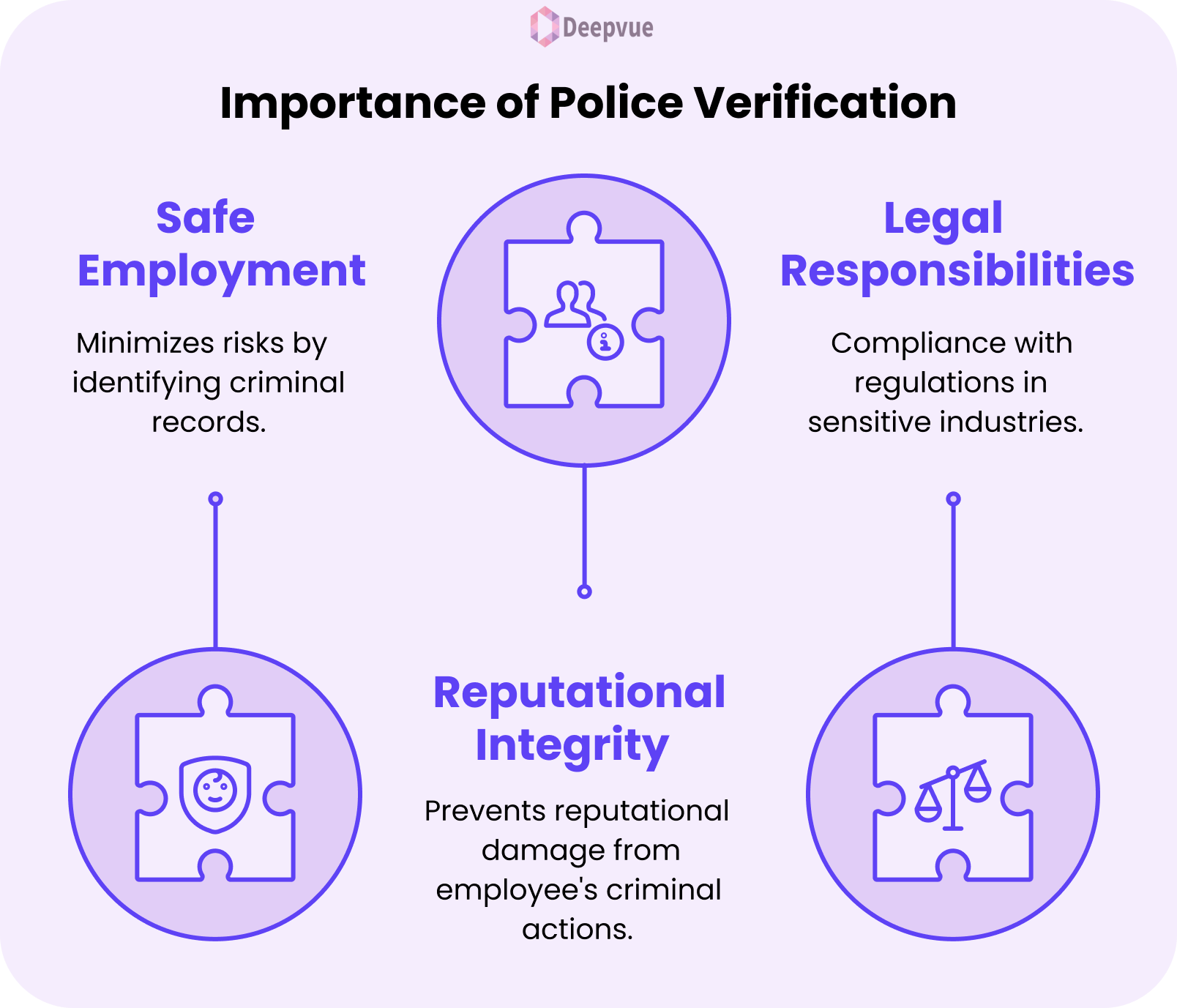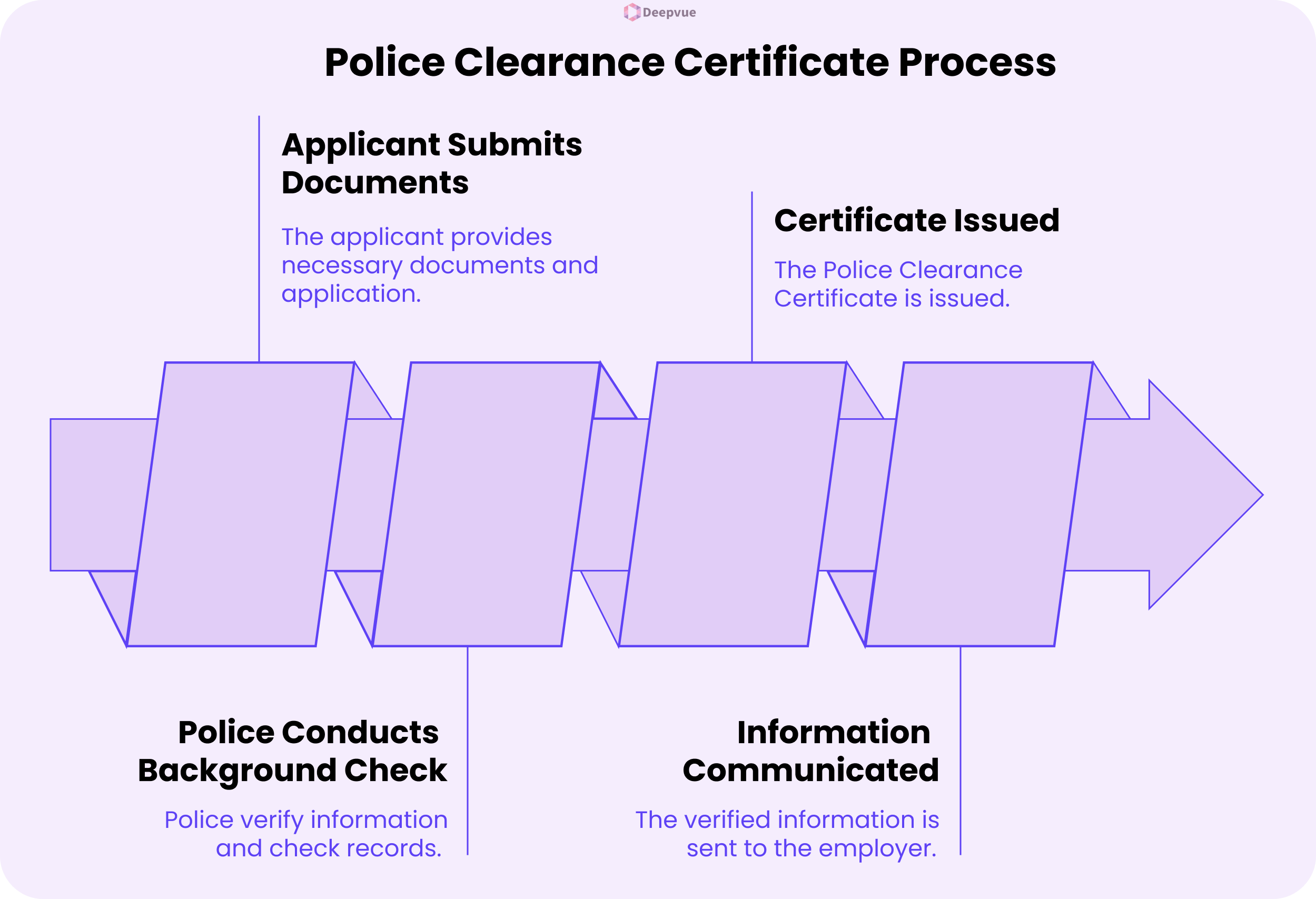Police verification for employment is a vital process in the hiring process that ensures potential employees do not have any criminal record that will threaten the organization. It entails verifying a candidate’s criminal record through official police records databases to confirm their identity and evaluate their background.
By conducting police verification, employers can mitigate potential risks, safeguard their reputation, and foster a secure work environment. Additionally, it serves as a deterrent against fraudulent applications and helps maintain workplace safety. In this blog, we’ll delve into the importance of police verification for jobs, how the process works, and why it has become a vital component of employee screening.
What is Police Verification in Employee Screening?
Police verification in staff screening is the act of confirming a person’s criminal history and background with the local law enforcement agencies to ensure that they do not have any criminal record or ongoing legal cases. It entails forwarding the employee’s identification data, including proof of identity, residence address, and biometric details, to the police for an in-depth background check. The police then provide a verification report that confirms whether the individual has any criminal records or ongoing investigations.
As per 86% of Indian respondents, they faced discrepancies in employment during screenings, with 43% of them specifically mentioning education-related discrepancies. Moreover, ISO-27001-certified organizations need to perform background checks to comply with standards.
Why is Police Verification Important for Employers?

- Safe Employment: Police validation ensures employers that they are minimizing the risks in hiring an applicant with a dubious criminal record since they have cross-checked and identified the background records.
- Safeguarding Reputational Integrity: Recruiting employees without police verification can risk a company’s reputation if a recruited employee is subsequently found engaged in criminal behavior, and thus, police verification becomes an essential preventive step.
- Conformance to Legal Responsibilities: In areas such as financial services, medicine, and safety, regulatory models tend to prescribe police verification for reducing risks, protecting sensitive information, and satisfying industry-specific statutes.
Components of Police Verification
- Criminal Record Checks: This involves verifying the criminal history of a prospective employee to assess their trustworthiness and ensure they do not have a criminal background that could pose a risk to the organization.
- Police Clearance Certificate (PCC): A legal document provided by police departments attesting to the fact that a person has no criminal history or that criminal history, if any, has been properly revealed.
The Process of Police Verification for Job
Documentation Required
- Identity Proof (e.g., Aadhaar, Passport, Voter ID)
- Address Proof (e.g., Utility Bill, Rental Agreement)
- Passport-sized Photographs
- Employment Offer Letter or Company Request Letter
Steps Involved

- The applicant presents the documents required and a formal verification application.
- The police make a proper background check based on the given information, such as address verification and a criminal record check.
- After the verification, the Police Clearance Certificate is then issued.
- The confirmed information is communicated to the employer or desired organization.
Challenges in Police Verification
- The employers are required to follow data protection legislation, including the Data Protection Act or GDPR, while dealing with personal data during police verification for job.
- Written consent of the candidate is required before commencing the verification process.
- Police verification records should be kept safe and accessible to authorized staff only.
Industries Relying on Police Verification Certificate for Job
- IT and Technology: To secure sensitive information and reduce the threat of cybersecurity.
- Finance and Banking: To avoid financial fraud and meet regulatory needs.
- Healthcare Industry: To provide protection to patient information and ensure a safe work area.
- Education and Academia: For safeguarding students and employees by making sure that individuals with criminal histories are not hired in schools.
Tools and Platforms for Streamlined Police Verification
AI-Assisted Platforms
- AI-driven platforms automate police verification by scanning criminal databases, verifying identities, and flagging suspicious patterns.
- These platforms use advanced algorithms to cross-match information, eliminating human error and speeding up verification.
- Examples include identity verification APIs, digital KYC solutions, and automated criminal background check software.
Verification Software
- Specialized verification software unifies background checks, criminal history searches, and document verification.
- It integrates with law enforcement databases to provide comprehensive reports and verification insights.
- Software solutions often include audit trails, automated alerts, and secure data storage for compliance.
Strategies for Effective Police Verification
- Put in place an explicit verification protocol involving employee consent, document retrieval, and verification of data.
- Combine multiple data sources, including local police history, national databases, and global watchlists.
- Employ biometric authentication and electronic identity verification to reduce risks from identity fraud.
- Keep detailed records of the verification process to avoid potential legal challenges.
- Enforce a secure data retention policy to hold verification records in confidence and comply with data protection laws.
Conclusion
Police verification for employment is not just a regulatory requirement — it is an active step that ensures workplace security and integrity for organizations. Adding identity verification APIs and KYC verification APIs makes the process even more efficient by allowing employers to verify candidate information easily and accurately. These solutions not only mechanize background checks but also minimize the chances of human error, fraud attempts, and noncompliance with regulatory requirements. Through the use of these APIs, companies can streamline the verification process, keep accurate records, and create a credible hiring culture.
FAQs
Why is police verification necessary for employment?
Police verification is necessary for employers to ensure a candidate’s criminal record and maintain a safe working environment while lowering the risk of hiring someone with a history of criminality.
What is verified during police verification?
At the time of police verification, police verify if the candidate has any criminal history, pending cases, or previous convictions related to them to authenticate their background.
Are background checks for prospective employees mandatory for Indian companies?
Yes, performing background checks is important for reducing risk, inhibiting fraud, and meeting regulatory requirements, especially in high-risk industries such as finance and security.
How do privacy laws impact background checks in India?
India’s data protection legislations, including the Data Protection Bill, oblige employers to obtain consent before conducting background checks and ensure that personal data is processed responsibly and securely.








